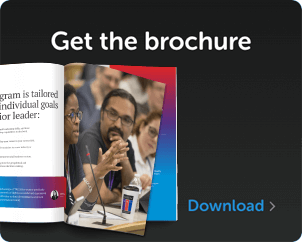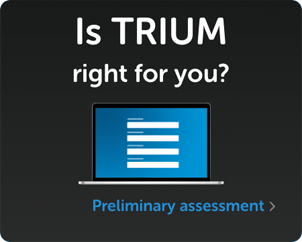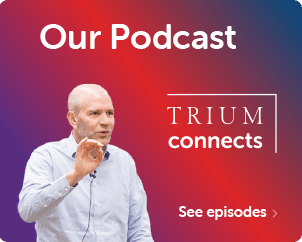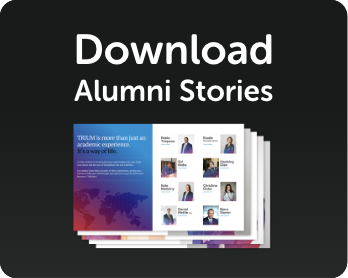
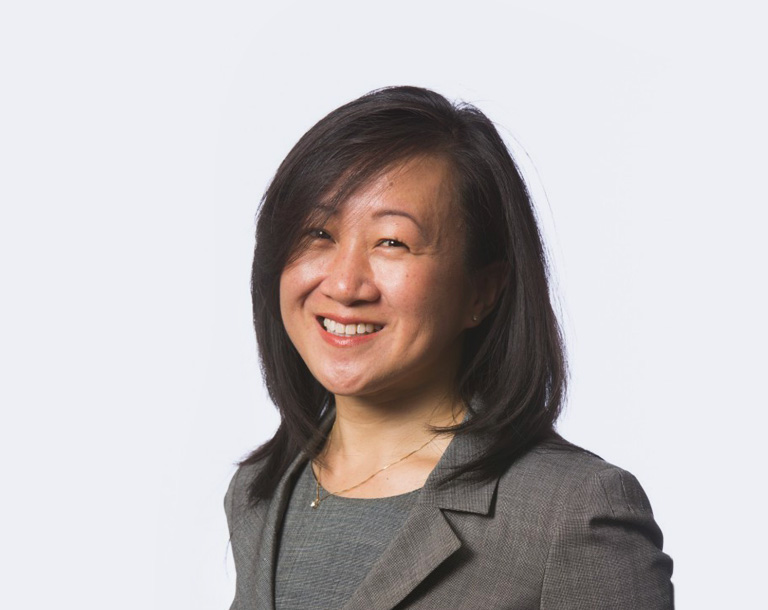
Elaine Tan
Elaine Tan (Class of 2016) on new perspectives that TRIUM offers
What was your thought process leading up to applying for the TRIUM EMBA?
I had reached a point in my career where I realised that it was time for a change. I had been thinking about changing sectors for a few years already. Having worked for the same organisation for over ten years, I felt my profile needed to be reinvigorated to benefit most from this transition. I took a long hard look at myself and realised that I first needed to focus my attention on figuring out what I still wanted to achieve and how I could best do it – it was clear I needed a transformative experience, as well as a competitive edge. That’s when my attention turned to Global Executive MBA programmes and their related capstones, both of which I felt would be essential for my career transformation.
You already had studied for an MBA, why did you consider taking another one?
Things have changed a lot since I completed my first MBA, not only in the business world but the world itself. I have also felt myself profoundly ‘changed’ after having worked in multiple countries over the past 15 years. My initial MBA curriculum had not considered the global business perspective, which is so important today, and certainly did not offer any mid-career support since it was not tailored for executives. I remember as well that I found myself learning more from textbooks than from my peers at that time. Now, with significant work experience already gained at the management level, I can instead focus on the practical aspects of this programme that are most relevant to my current responsibilities and longer-term career aspirations. I can do this with the knowledge and confidence that on the TRIUM programme I am surrounded by the people who are in the best position to help me achieve my current professional objectives.
How much research into MBA programmes did you do?
I looked at HEC originally, as I am based in Paris and many colleagues recommended it to me because of its reputation for being a prominent business school in Europe and being ranked number one in the world for executive education. It was through HEC that I discovered TRIUM. I did a lot of due diligence, however, before I decided to accept the offer from TRIUM, including comparing it with competing programmes to determine which one was best suited to my requirements. By the time I started I already knew what to expect because I had already spoken to a considerable number of TRIUM alumni to gauge their own experiences. Most of them described to me how it had changed their lives and gave them new perspectives, including an expanded professional network of lifelong friends – this was what I was looking for.
Why TRIUM specifically?
When I started to look at the programme, I quickly felt it was exactly what I needed for a number of reasons. First of all, as I mentioned earlier, I was seeking a global programme — in terms of content, locations, and classmates — to avoid regional biases as well as to maximise international opportunities. The modular format was also very convenient for me, as it allows me to stay and work in Paris, while simultaneously giving me the chance to spend a significant amount of quality time with my classmates, who are based all over the world. Secondly, the average age of the typical TRIUM student cohort is much more reflective of senior-level executives, while other programmes I looked at appeared to be heavily-weighted towards younger people with much less management experience. This was important to me because my priority was to learn from, exchange ideas and collaborate with peers at the same professional level and age group as me, since we would have similar outlooks and be facing comparable challenges and opportunities in the workplace and our personal lives. Thirdly, and most important of all, the FT ranking and individual profile of each partner school were crucial to my decision, as I wanted to have access to the most influential alumni networks around the world and be with classmates who shared the same goals and ambitions as I do. Each of the three schools are top-ranked in their own geographical region and world-renowned for their distinct area of specialty that they specifically contribute to the programme. Instead of having to choose one over the other, TRIUM offers the best of each, integrated seamlessly together, with a 14 year successful track record. What more can one ask for?
Was there anything particular to TRIUM that you didn’t necessarily find elsewhere?
What really attracted me was the unique geo- and socio-political perspective of this programme, which is offered by the most prestigious LSE. This viewpoint is something very distinct from other EMBA programmes out there. Having the experience of working for an international organisation in the highly-political space sector, I firmly believe a systematic understanding of this context is critical to making international business decisions. In particular, I was very impressed with LSE’s choice to highlight the implications of climate change, as I personally feel that not enough people in leadership positions appreciate just how much this reality will impact our future, regardless of where we live, and how it will change the overall international business landscape. We need to be especially cognisant of these changes to anticipate the future for our organisations and decide what role we want to play in order to maintain or gain a competitive advantage. On a similar note, the programme also admirably reflects upon the need for greater corporate social responsibility, and in addition to bringing attention to this topic, demonstrates how there can be a business case for it. TRIUM’s focus on how the world is evolving, as a whole, by synthesising all the key developments that are most relevant for global managers, effectively prepares us for taking on more strategic leadership roles and meaningful responsibilities in the future, in both for-profit and not-for-profit organisations.
How did you find the admissions process?
In addition to ensuring candidates are suited for the programme, my admissions officer wanted me to be comfortable with the knowledge that I was making the right choice for me. Being able to have frank discussions with many alumni and meeting faculty members at a Lunch & Learn session gave me further insight into the execution of the programme itself and convinced me that it was a very good fit for my expectations.
How are you enjoying the programme so far?
It’s an incredible experience. I can certainly say without reservation that my high expectations are being met. The first module at the LSE, I enjoyed it immensely as it brought me up to speed on the key developments which shaped and are shaping the world to come. Having worked in a politically strategic sector for more than a decade, this component resonated strongly with me. In addition to learning more about the evolution of other important sectors and participating in lively debates with distinguished faculty, it was also the opportunity to get to know everyone in the programme. New York was different. It was exciting in the sense that I lacked direct experience with the financial sector beforehand and looked forward to having a better understanding of it and the decision-making involved. This was especially the case knowing that I would have the best professors in this area to push me out of my comfort zone. The module was very academically rigorous and did indeed push us to our limits. We were warned that it was intensive and for those who do not come from a finance background I confirm that it’s definitely a challenge, but I also feel the rewards were much higher for us when we finished. The Shanghai module, on the other hand, was the first time that we focused on a particular region in the world, and could apply the concepts that we learned in the first two modules in an integrated manner. This time, there was much more focus on practical aspects rather than academics, which many of us appreciated. Every module has until now been very different, but always building upon the previous ones in a logical way. I am looking forward to discovering how the other modules present themselves!
During Module 3 you started your Capstone Project – how was that?
During this module, we finally kicked off our Capstone work, which, for me, was a fundamental reason for choosing this programme, so I am very excited about what lies ahead. I have great people in my team. We each have different competences but share a common passion for mitigating climate change through greater reliance on renewable energy sources. We have, therefore, all personally committed to seeing our capstone go live. Starting up a new company is always a great learning experience regardless of what stage of career you are at because it offers you the opportunity to apply what you have learned outside of the parameters of your regular job. Most importantly, I am using this experience as an entry point into a sector I have always been interested in and would like to transition to. This is what I truly appreciate about the TRIUM programme. With diverse, experienced professionals as your classmates, and the support of renowned faculty and a well-placed alumni network, the Capstone Project allows you to pursue business opportunities with a greater likelihood of success than you would ever have imagined doing on your own.
How do you find the transition back into your job?
Once you finish a module you have a number of assignments to complete afterwards to apply what was taught. They are also very time intensive, especially those that involve group work. I’m lucky in a way because before the programme, I decided to take on a consulting role to my organisation to allow me the flexibility of choosing which projects I will work on and when. In terms of balancing, I just make it work – you have no other choice. I am not saying that it is easy, because the number of hours one must commit to the programme is high, but at our level, we are all used to intense time pressures, and so it is just a question of prioritising and making compromises when required. A top-ranked Executive MBA is not for the light-hearted and it should not be. Returning to work after each intensive study module does take a bit of time to catch-up, but the post-module assignments, followed immediately afterwards by pre-module readings, keep us on our toes the entire time. My cohort is already half way through the programme, and it feels like we just started yesterday!
How do you find your classmates?
The calibre of my classmates is truly inspirational and humbling. They are a diverse group of senior executives from all over the world, each having already accomplished so much in their respective areas of expertise. I have discovered that despite the diversity, many of us are at similar points in our careers, and are also using this programme to identify new opportunities for ourselves or for our organisations to grow. This sharing of similar experiences and new ideas is both reassuring and greatly motivating. Not only are we learning from and expanding each other’s horizons, but a number of classmates have even gone out of their way to organise trips for us to learn more about their respective regions and to develop further business contacts there. As we take this journey together, the growing closeness of our friendships is evident with each module, and I have no doubt that we will all be able to count on each other long into the future after graduation.
Do you have any advice for potential students?
Do not take the decision lightly to embark on this programme. Know what you want from it and use it to achieve those ends. The intensity of each module is extremely high and the amount of work required in between each module should not be under-estimated, but the rewards will be equally high. In order to maximise your returns from this programme, you need to fully commit to it and to your classmates, especially those in your study groups and Capstone team. You will quickly discover that you are not taking the EMBA journey alone because many people, with equally busy schedules, will be relying on you, and you do not want to let them down. It is therefore strongly recommended that you have the support from your employer as well as your loved ones ahead of time. Otherwise you will face time management challenges for the duration of the programme, which will reduce the quality of your experience. Once you are ready to do it, then do not hesitate — take the plunge. You will not regret it!

